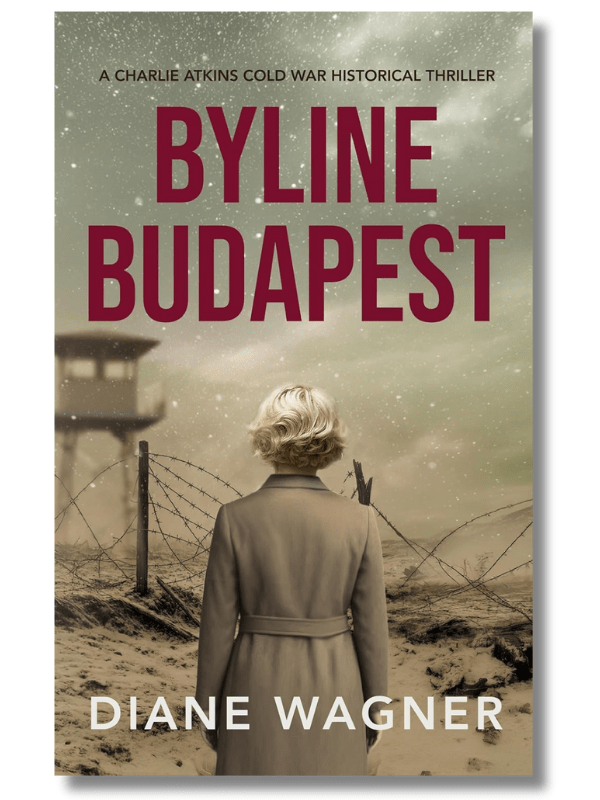Byline Budapest
by Diane Wagner
Genre: Mystery, Thriller & Suspense / Historical
ISBN: 9798999326317
Print Length: 360 pages
Reviewed by Eric Mayrhofer
A post-WWII story with a clear sense of history and some truly thrilling scenes
With Diane Wagner’s Byline Budapest, readers can relax, confident that they’re in the hands of a gifted storyteller. Wagner shows an authoritative knowledge of the time period without ever letting it get in the way of a pulse-pounding tale.
We follow Charlie Atkins, an American expat in Munich working for Radio Free Europe, a station broadcasting pro-democracy news stories to citizens in nearby countries who want democratic reform for their governments. In love with the organization (perhaps naively so), Charlie longs to be part of the new staff instead of a coffee girl, and when she gets an opportunity to prove herself with a story about blood donations making their way to a war-torn Hungary, she jumps at the opportunity.
While women in the newsroom may have been more uncommon in the post-WWII era, the book makes the adventure believable by couching it in a deep familiarity with the geopolitics of the time. Charlie can rattle off the current events as well as the reporters she wants to join, proving her worthiness early on (even if the editor Mr. Owens refuses to acknowledge it). The authoritativeness with which the narration handles explanations of history makes it easy to trust and emotionally invest in all the other characters and harrowing obstacles that fall in Charlie’s path.
The book also plays with format to give readers the sensory experience of a radio broadcast. Throughout the book, readers will see Charlie’s radio reporting chops in action, presented in a radio script format, and anyone who has ever heard an NPR story will immediately hear Charlie’s voice as the confident reporter turned storyteller spinning yarns around the fire. These passages evoke narration interspersed with interview soundbites. After one story, readers discover that “Charlie worked hard, learning to write for listeners rather than readers…She incorporated music and sound effects,” making the whole radio news experience complete.
Wagner does a great job of characterizing these people in short windows, vividly sketching in what readers need to know and then moving along with the plot. While learning about Charlie’s professional life and her journalistic aspirations, we meet her colleague Viktor, a man with a coveted news staff position who readers will quickly grow to loathe (and love it). We see him through Charlie’s eyes and he immediately sets readers on edge: “His blue eyes, as cold and hard as January ice, his cheekbones, as sharp as right angles, and his teeth, which were broken and jagged like rickrack.”
That ability to concisely distill a character’s essence is a powerful gift, but it occasionally threatens to go awry. When characters meet Andras Kovács, a native Hungarian in the employ of Russia’s Communist regime, we quickly learn he’s meant to be the book’s foil for Charlie. When thinking of the Communists’ deteriorating hold on Hungary, he wonders, “And what to tell Moscow? That the entire country had gone mad on his watch? Not that Kovács was surprised, of course. He sensed for months that trouble was coming, and although he warned Hungary’s deeply loathed General Secretary Mátyás Rákosi directly, no one wanted to hear that unrest was brewing.”
Kovács is just as frustrated and disregarded by his peers as Charlie; a lovely setup to propel readers ahead—will he achieve his goals and stand in her way? Will he fail? Readers don’t get the full picture as quickly and deeply with him as we do our heroine. Yes, we do come to understand that he is a survivor, always knowing where the political wind is blowing and flowing with its currents. However, it’s a little blurry where and how that deep survivalist instinct gels with his desire to be seen, respected, and included by his peers.
This never stops Byline Budapest from being a good read though. If the book ever seems like it’s entering enough of a lull for readers to ponder on these mild contradictions, it quickly and organically introduces a thrilling action scene that cements your hatred of Kovacs, makes readers re-evaluate how ready Charlie is for the challenges of a war zone, and wondering how she will get back to Munich alive, let alone into the Radio Free Europe news room. If future installments of this expected series can keep the same brisk pace and astonishing grasp on history, sign me up.
Thank you for reading Eric Mayrhofer’s book review of Byline Budapest by Diane Wagner! If you liked what you read, please spend some more time with us at the links below.
The post Book Review: Byline Budapest by Diane Wagner appeared first on Independent Book Review.
